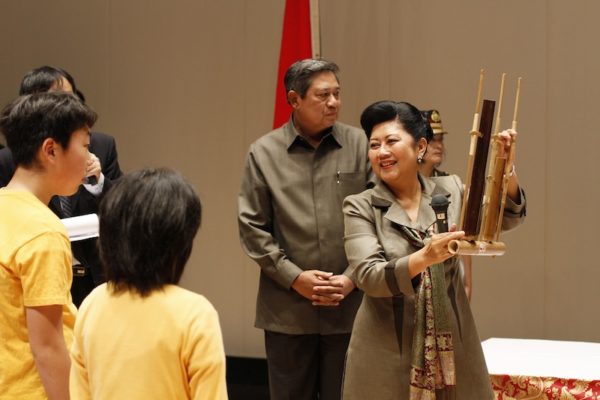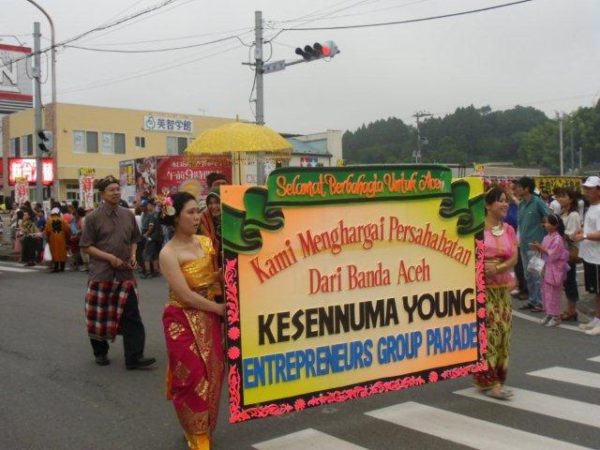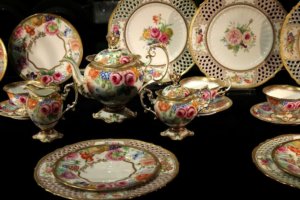Interview with Ambassador: Muhammad Lutfi, ex-Indonesian Ambassador to Japan (now, Indonesian Ambassador to the United States as of September 14, 2020)
CONTENTS
“We are at a critical juncture. We can cooperate together.”
By Ryoji Shimada, staff writer
“I want to be a single-handicap golf player. I want to ski down a ‘black’ (advanced) slope. And most importantly, I want to finish the Tokyo Marathon next year in under four hours,” said a smiling Ambassador Muhammad Lutfi on some of his personal goals he has set for himself while in Japan. “I already got an invitation for the marathon from the governor,” he added.
Born in 1969 and appointed in September, 2010 to the Indonesia’s largest overseas embassy (in terms of size of its diplomatic staff), he is the youngest Ambassador among all the Indonesian Ambassadors. Although the interview was conducted in late afternoon on a mid-summer day during the fasting month of Ramadan, Ambassador Lutfi, educated in the Purdue University, Indiana-USA, looked energetic and spoke briskly in his fluent English about the importance of the current bilateral relationship.
Japan As the Biggest Investor
“We (Indonesia and Japan) are at a critical juncture. It is my job to step up the relationship,” the Ambassador asserted. To build bridges between the two nations, he is forced to deal with numerous issues: diplomacy, politics, socio-culture, and others. But this embassy focuses most heavily on economics.
Surely, the trade figures show how strongly the two countries are interconnected. Such exports as automobiles, steel or electronic products from Japan amounted to about 1.4 trillion yen ($17.6 billion) in 2011, up roughly double from about 777 billion yen ($9.7 billion) in 2001. As for Japan's imports from Indonesia, the 2001 figure of about 1.8 trillion yen ($22.5 billion) grew to about 2.7 trillion yen ($33.7 billion) in 2011. Most of these imports were primary products such as petroleum, natural gas, minerals or lumber. Furthermore, since the Japan-Indonesia Economic Partnership Agreement (JIEPA) --- Indonesia’s first-ever bilateral economic agreement --- came into effect in 2008, direct investments in Indonesia from Japan have grown year-by-year.
“We are very busy accommodating, assisting and helping Japanese investment in Indonesia. Japan is the biggest investor for us,” said the Ambassador, who formerly served as Director General of BKPM (The Investment Coordinating Board Republic of Indonesia). According to BKPM, the total amount of investment from Japan in 2011 reached 1.51 billion US dollars. The pace has been quickening as the amount of investment in the first half of this year has already reached 1.13 billion US dollars, and is expected to reach 2 billion by the end of the year.
Tokyo-based Kao Corporation, a major household product and cosmetics manufacturer with annual revenues of around 1.2 trillion yen ($15 billion), announced late July that it would spend about 10 billion yen ($125 million) to build its second factory in Indonesia, which will produce such daily commodities as cosmetics, detergent, disposable diapers and so on. Its president Mr. Michitaka Sawada has stressed in an interview with the media, “We first target China and Indonesia. We are latecomers and the market is very competitive. But for our future growth, this is the path we must take. We will persist and strive until we achieve success.” Currently 81% of company’s profits are generated by domestic business. “For continuous business growth, we will urgently need to modify our business structure,” Mr. Sawada also remarked.
Kao’s move is a case in point. Behind Japan’s investment drive are various factors that negatively influence its domestic economy. “I don’t have to explain it, but the current strong yen and the aging society push this country to go abroad,” said Ambassador Lutfi. An economist at the Bank of Tokyo-Mitsubishi UFJ came to the same conclusion, stating: “Unless the US economy improves, the yen will continue to maintain its strength. Japanese companies are setting up new factories in emerging economies to make inroads into the new market.”
But Japan has numerous other neighboring countries. So why Indonesia? NHK (the Japan Broadcasting Corporation) earlier this year reported that Japan became the top country for the first time in five years in terms of its scale of investments in Indonesia, pointing out such reasons as the country's rich natural resources and relatively low labor costs in comparison with China. The Ambassador also remarked, “In 2012, 52% of our population is under age 28. We won't have an aging society until the year 2060. So the two countries can cooperate together.”
“From Red Tape to Red Carpet”
There's another important factor that cannot be disregarded. During the Ambassador's previous tenure as the head of national investment-coordinating board (BKPM), a Minister-level position, he streamlined the investment process. “Indonesia was once notorious for the lengthy time to process permits --- very long,” he points out. “According to the World Bank, it took 151 days to start a business in Indonesia and there was less transparency in the system. We needed outside investment. But when people tried to invest, it took so long and they encountered an unfriendly reception. This kind of red-tape plagued system needed to be rectified.” Reform was made in three areas: officials say at the beginning what were the requirements, how much time would be required, and how much it would cost. After the reform, the 151 day-period was reduced to 40 days.
“The most important thing is the philosophy. Officials are the servant of service. It has to be red carpet not red tape,” the Ambassador observed.
“Our culture seems to fit.”
But there's a more important factor that probably pushed Japan to the role of Indonesia's top investor. “First of all, we share the same democratic values, like freedom of speech. Japanese are mathematical (precise) and polite, while Indonesians are artistic and warm,” said the Ambassador who raised some unique comparisons. “Also we both respect the elderly and teachers like no others. Our cultures seem to fit.
“Javanese are akin to Japanese. They don't talk straightforwardly. When I am at a loss and don't understand a situation in Japan, I close my eyes and think how Javanese would act in this kind of situation. And most of the time, I acted all right after all.” The Ambassador was born in Jakarta, the nation's capital on the island of Java.
According to research conducted earlier this year by the Lowy Institute for International Policy, an Australian think tank, 66% of Indonesians harbor warm feelings toward Japan --- the highest percentage among 21 nations, surpassing its northern neighbor Singapore (64%) and the United States (64%). The research also notes Japan is viewed as the most trusted foreign nation among Indonesians, with 80% expressing that sentiment. “When Indonesians go out, they see Toyota Kijang and Panasonic products. As for motorcycles, Honda and Yamaha control 80% of the market. It is very Japanese,” said the Ambassador. So positive feelings and some closeness between the two nations must play some important role behind this growing investment.
For investment advice, he suggested that the willingness to understand Indonesians and becoming Indonesian is a key. Not only speaking their language but understanding their way of thinking is important. “Panasonic came and capitalized on the distribution. Panasonic learned from Gobel (its Indonesian partner) and became very Indonesian and successful,” said the Ambassador.
Technology Rather Than Investment
But the amount of investment is one thing and quality is another. “In 2013, the amount of investment from Japan might be close to 3 billion dollars which would be four or five times that of 2010. But to me, more important is the alliance of technology. Almost half of our exports come from natural resources and basic commodities. We need innovations and technologies to create more valued-added products. Japan has one of the best technologies in the world. In order to survive in this global economy, you and I need to work together,” insisted the Ambassador.
Indonesia's Antara News reported in May that Mr. Hidayat, the country's Minister of Industry, announced the signing of agreement with Toyota Motor Co. on production and sales of a hybrid car model in 2014. Honda Motor Co. issued a press release in July announcing it would manufacture its hybrid cars in Thailand. Minister Hidayat hopes Honda will come to Indonesia too.
For the alliance of technologies, high expectations have been placed on the automobile industry. But the Ambassador also mentioned such other technologies as solar panels, MRT (Mass Rapid Transit) and jet aircraft. Pointing at a model of the MRJ (Mitsubishi Regional Jet) near the wall, he said with a grin, “I want it to be made in Indonesia.”
In fact, within the JIEPA, there is an initiative called MIDEC (Manufacturing Industrial Development Center) through which Japan cooperates on basic technologies such as cutting, casting, welding metals or upkeep of energy and specific manufacturing technology sectors such as automobiles, electronic products or petrochemicals.
“Through MIDEC, we can enhance Indonesian competitiveness,” the Ambassador stated.
Issue on Nurses and Care-workers
Through the JIEPA, tariffs on 90% of exports from Japan and the 93% of imports from Indonesia will eventually be abolished. Besides the MIDEC, JIEPA provides for another notable agreement. In light of the long-term shortage of personnel, Japan has been accepting Indonesian nurses and care-workers. But the project currently faces great difficulties.
Through EPAs (Economic Partnership Agreement), Japan since 2008 has accepted more than 1,300 nurses and care-workers from Indonesia and the Philippines. But they are all candidates, i.e., accepted on a tentative arrangement. Even though the nurses are professionals in their home country, they must qualify by passing the Japanese exam within three years of their arrival. But because of the language barrier, the passing rate was mere 1.2% in 2009 while the passing rate among Japanese candidates is usually over 90%. The main obstacle is believed to be the difficult Japanese writing system, which contains thousands of kanji (Sino-Japanese characters).
To deal with the problem, Japan's Ministry of Health, Labour and Welfare simplified the examination from 2011 by adding hiragana (phonetic readings) to complicated kanji or using the English names for diseases. This has helped to some degree, as the passing rate this year improved to 11.3%, or 47 candidates out of 415, but the figure is still very low. According to International Migration Outlook among OECD member nations, foreigners accounted for 28.6% of the nurses in Switzerland and 24.8% in Australia, etc.
“This is my personal opinion,” the Ambassador commented. “Maybe with all the minuses and pluses, Japan might not be ready to accept foreign skilled workers, especially in the field of nurses and care-workers. But because I value the relationship of the two countries very much, we should become passive in this process and wait until such time that Japan is ready. During the review this year, we should discuss whether we should continue or delay this project.”
Meanwhile, the Ministry decided in August it would extend the exam time from the current two hours and 40 minutes to three hours and half next year. Asked if he hopes that Japan will accept more candidates, the Ambassador said, “It is more than hope, I think, everybody understands it is necessary. But I value the relation more than anything else. I tend not to comment on that.”
Views on Japan
Although the Ambassador was reluctant to dwell upon negative aspects on Japan, he analyzes the country objectively. “There are three things in particular. I think Japan can do better with: its politics and trade, and needs more people to grow.” Since his appointment in September, 2010, he has met with three of Japan's foreign ministers and four economic ministers. He thinks the politics should be calibrated. “Popular mandate is very important to run an efficient government. So I like the idea Osaka mayor Mr. Hashimoto brings that the prime minister be elected directly by people.”
About trade matters, citing the high presence of Korean electronic makers abroad, the Ambassador noted, “For Japan's good competitiveness outside, TPP (Trans-Pacific Strategic Economic Partnership) is not a bad idea. Protecting agriculture which accounts only 1.5% of GDP and sacrificing other, bigger industries would not be a very wise move.” At the moment, amid the pressure from the pros and cons, the Japanese government is at an impasse and hasn't yet formally declared the participation in TPP.
Lastly on the third issue, introducing the example of the United States which expects 30 million, about 10% of its population from abroad, “Do you know why? They need them for innovation and creativity. They are strengthening the core of the society. With all due respect, Japan should be more interested in this issue,” remarked the Ambassador.
Food, People, Culture and Kesennuma
On the other topics, the Ambassador lavished praise on almost everything Japanese. “I love the food, the people and the culture. The food is probably the best on earth,” he enthused. His wife, Bianca, is a food critic and she is also fascinated with Japanese cuisine.

“It is very serious endeavor to find bad food in Tokyo --- not only Japanese food but foreign food. French food cooked by a Japanese chef is maybe better than any food in Paris,” the Ambassador said, only half jokingly. He also gives rave reviews on how polite and kind the people are, saying, “They learn from their youth to eat every grain of rice in the bowl. The spirit of ‘mottainai’ (avoiding waste) is unbelievable.” He then mentioned the spirit of Bushido, Zen Buddhism and praised Japanese perseverance as second-to-none, saying, “If they are willing to do something, they go beyond their limits in order to get things done with perseverance.”
When asked about his favorite place in Japan he said, “I must say Niseko, Hokkaido, since I fell in love with skiing. There are many other places, Tokyo, Kyoto and Naha, Okinawa Prefecture. But the really special place for me is a city of Kesennuma, Miyagi Prefecture (in Tohoku, the northeastern region of Japan). It has to be Kesennuma. The relationship between the city and the embassy is quite close.”

The city has nurtured close relations with Indonesia for a long time. Kesennuma is, like other cities in the Tohoku region, experiencing the diminishing youngsters and the aging of its population. The main local economy is fisheries and it has relied on young foreign workers like Indonesians. According to a report by JICA (Japan International Cooperation Agency), the relationship dates back to the trawling of prawns off the coast of Maluku, Indonesia about 40 years ago and now two-thirds of personnel for pelagic tuna fishing, about 800 men, is filled by Indonesians. Also the processing and canning of fish is done by many female Indonesians. At the local biggest summer festival, Kesennuma Minato Matsuri, the embassy sends a contingent and a Bali Parade is held by a local youth group. But the city was severely damaged by the 3.11 disaster. So strong are the ties, that Indonesia's president, Mr. Yudhoyono, chose the city for a consolation visit last June at which time he made a monetary donation of two million US dollars. “Personally I spent lots of time there to the point that I memorized my way around the city. Kesennuma will be special for me the rest of my life,” said the Ambassador.
The world's fourth largest nation in terms of population, with about 240 million, Indonesia now ranks as one of the 15 largest economies, with a GDP of over $1 trillion. It aims to reach seventh place by 2030 and fourth place by 2050. Japan is destined to play a critical role in this process.
“Improving a system is not so much an action as it is a philosophy and a way of thinking. That means you have to improve all the time. It never ends. Am I satisfied when I left? I think we could do more. But it was going in a right direction,” said Ambassador Lutfi, in reply to a question on his reform of the investment process. But the same thing could be applied to this important bilateral relationship that he values the most.


